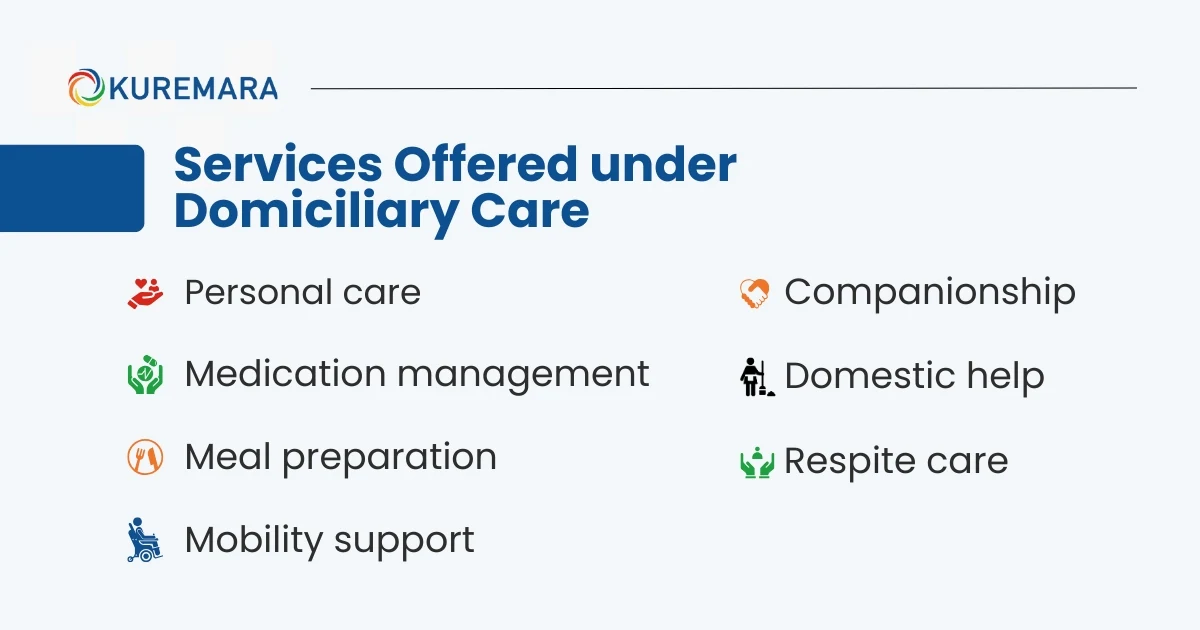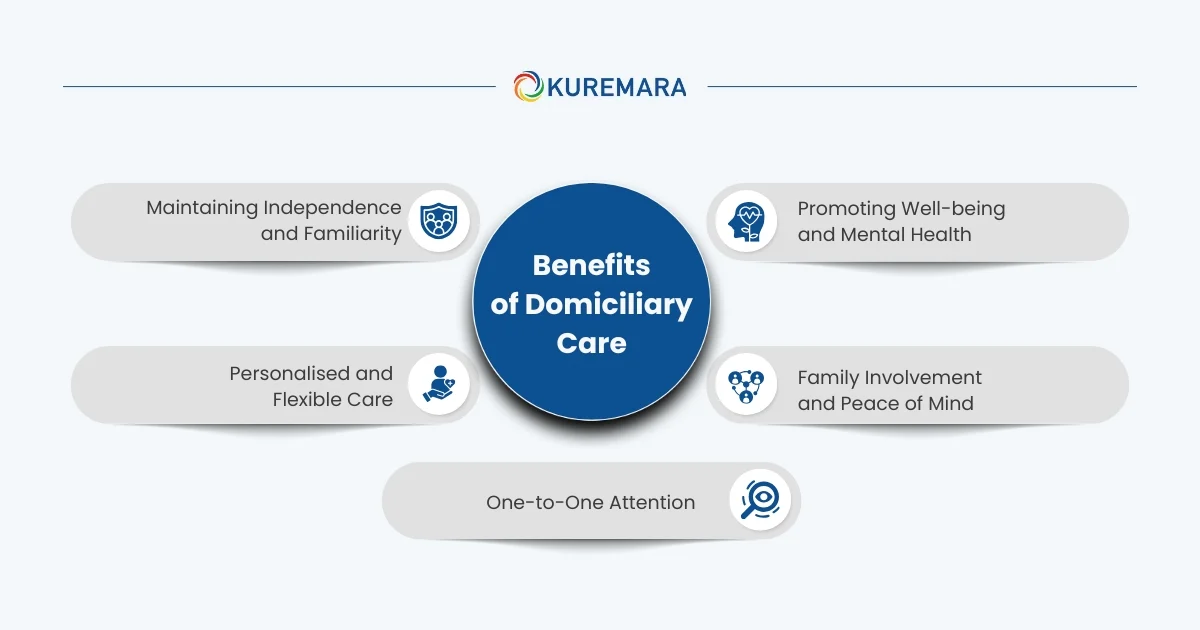
Choosing care for a loved one is one of the most emotional and practical decisions a family can face. It often involves balancing safety, comfort, affordability, and the well-being of the person in need. With so many options available for elderly care, making the right choice can feel overwhelming, especially when families are unfamiliar with various care options or what each entails.
Among the choices, domiciliary care, also known as home care, is emerging as one of the most popular solutions. It offers tailored support delivered directly to a person’s home, allowing individuals to maintain their routines and independence while receiving the care they need.
In this guide, we’ll walk you through everything you need to know about domiciliary care: what it is, its core benefits, cost implications, how it compares to other types of care, and how to choose the right provider. We’ll also highlight how Kuremara’s domiciliary care services stand out.
What is Domiciliary Care? Understanding the Basics
1. Definition of Domiciliary Care
What is domiciliary care? Simply put, it’s a service where trained carers assist individuals in their own homes with daily tasks, ensuring they can live safely and comfortably. Often referred to as home care, in-home care, or care at home, this option provides a practical alternative to moving into a care facility.
2. Scope of Services Offered
Domiciliary care services can vary based on individual needs and typically include:

- Personal care (e.g., bathing, dressing, toileting)
- Medication management
- Companionship
- Domestic help (e.g., cleaning, laundry)
- Meal preparation
- Mobility support
- Respite care for family carers needing a break
These services can be scheduled as needed from a few hours a week to full-time care.
3. How it Differs from Other Care Types
Unlike residential care or nursing homes, domiciliary care allows individuals to stay in the comfort of their home. This flexibility often makes it a preferred choice for those valuing independence and familiar surroundings. While nursing homes offer medical support in a facility setting, domiciliary care brings non-medical and clinical assistance right to your door.
The Compelling Benefits of Domiciliary Care

A. Maintaining Independence and Familiarity
One of the key benefits of domiciliary care is the ability to continue living in your own home. Remaining in a familiar environment supports independent living, offers comfort, and helps reduce anxiety that may come from relocating to a facility.
B. Personalised and Flexible Care
Every individual has unique needs. Personalised care ensures support plans are tailored whether it’s daily help with meals or weekly companionship visits. This flexible care plan can adapt over time as needs change, providing peace of mind for both the recipient and their family.
C. One-to-One Attention
Domiciliary care offers dedicated care, meaning each visit is focused solely on the individual. This one-on-one support ensures a higher level of attentiveness compared to care homes, where staff are responsible for multiple residents.
D. Promoting Well-being and Mental Health
Being in a familiar environment and receiving personalised support has a positive impact on emotional well-being. Regular social interaction with carers helps combat loneliness and supports better mental health.
E. Family Involvement and Peace of Mind
Families often feel more involved with domiciliary care. They can actively participate in care planning, stay updated on their loved one’s well-being, and feel reassured that their family member is in capable hands.
Cost of Domiciliary Care: What to Expect
* Factors Influencing Cost
The cost of domiciliary care depends on several factors:
- Frequency and duration of visits (care hours)
- Level of support required
- Location of the individual
- Type of services (e.g., personal care, overnight care)
Care can be arranged on an hourly, daily, or live-in basis, with pricing adjusted accordingly.
* Understanding Funding Options
In many regions, there are funding solutions available:
- Local authority funding based on a financial assessment
- Direct payments or personal budgets from government schemes
- Private pay arrangements for those not eligible for funding
Understanding your eligibility and options can help reduce the financial burden.
* Value for Money
Compared to residential care facilities, domiciliary care can be a cost-effective solution, especially for those who don’t require round-the-clock medical care. It’s also more adaptable, with the ability to scale services up or down as needs evolve.
Is Domiciliary Care Right For You or Your Loved One?
Domiciliary care is particularly suitable for:
- Elderly individuals needing day-to-day assistance
- People with disabilities requiring support with daily living
- Those recovering from hospitalisation
- Individuals preferring to stay at home rather than move into residential care
A care needs assessment often carried out by a care agency or local authority helps determine the right level of support. It considers physical, emotional, and social needs and results in a care plan tailored to the individual.
Choosing the Right Domiciliary Care Provider
When choosing home care, look for the following:
- Regulatory body ratings (e.g., CQC in the UK)
- Experienced and qualified carers
- Positive client testimonials
- Transparent pricing and flexible service options
Most providers begin with an in-home visit to assess the individual’s condition, understand their preferences, and design a care plan. This is a crucial stage in aligning care with the client’s lifestyle and values.
Trust and compatibility matter. A good care agency prioritises continuity, ensuring the same carers visit consistently. This fosters a strong relationship and provides emotional security for the individual receiving care.
Kuremara’s Domiciliary Care Services: A Closer Look
At Kuremara, we believe care should feel like family. Our focus is on empowering individuals to live independently with dignity, providing support that’s respectful, reliable, and rooted in compassion.
Range of Services Offered by Kuremara
We offer:
- Personal care and hygiene assistance
- Medication reminders and administration
- Help with meal planning and preparation
- Companionship and social support
- Light housekeeping
- Overnight and respite care
Our team works closely with families to ensure the best outcomes for everyone involved.
Commitment to Quality and Personalisation
We pride ourselves on delivering personalised care plans based on thorough assessments. Our carers are trained, vetted, and continually supported to ensure a high standard of service.
Many families have shared their success stories, highlighting the comfort and peace of mind they’ve gained with Kuremara’s services. We believe in celebrating every small win along the care journey.
Empowering Choices for Quality of Life
Domiciliary care offers a unique combination of personalised care, independence, emotional support, and cost-effectiveness. It allows individuals to age in place with dignity and confidence.
More than just practical support, domiciliary care enhances daily living emotionally, physically, and socially, leading to a richer, more fulfilling life at home.
Whether you’re exploring care for yourself or a loved one, consider the benefits of domiciliary care. At Kuremara, we’re here to help you make an informed decision.




